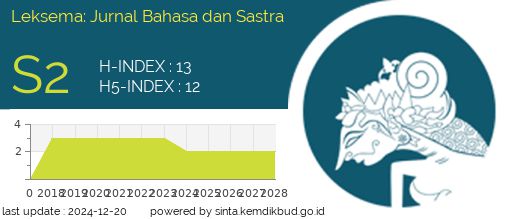THE CONTRIBUTIONS OF LITERACY SKILLS TO NATIONAL DEVELOPMENT
DOI:
https://doi.org/10.22515/ljbs.v1i2.101Keywords:
basic, critical, functional, literacy, scientific, societyAbstract
Literacy refers to a set of skills for being literate of texts existing in society. There are many kinds of information penetrated among us. Being literate is now not only just represented by reading and writing as we simply do every day orthographically. It remains on basic literacy. This one itself has been improved for considering economic development by adding arithmetic skill. Literacy, with those language competences, considers its contribution for society in this modern age. It is considered as resource to reflect quality of each person. This functional literacy takes us for being functionally beneficial for surrounding environment. For dealing with the information around us which is massively spread, critical literacy should be optimized to make sense and take stance. In higher education context like university, scientific literacy is highly required to apply the subject for phenomena in the society. Along with types of literacy, how are their contributions on society? Being capable on multiple literacy levels is believed as the right way for familiarizing social phenomenon so that literate people have more chances to get possibilities for themselves up to strengthen citizen involvement for their nation as well. Literacy is finally constructed from optimizing each citizen on nation’s development.
Downloads
References
Ball, Arnetha F and Freedman, Sarah Warshauer. 2004. Bakhtinian Perspectives on Language, Literacy, and Learning. Cambridge: Cambridge University Press.
Coming, John; Garner, Barbara; and Smith, Cristine (ed). 2001. National Center for the Study of Adult Literacy. San Francisco: Jossey-Bass.
Fairbairn, Gavin J. and Fairbairn, Susan A. 2001. Reading at University. London: Open University Press.
Hauser, Robert M et al (eds). 2005. Measuring Literacy: Performance Levels for Adults. Washington: The National Academics Press.
Imawan, Teguh et al. 2014. Indonesia : The Untold Stories. Jakarta: Ministry of Communication and Information Technology of the Republic of Indonesia
Kompas (a). 2015. “Budayakan Ruang Baca Sekolahâ€. November 18th . p.10
Kompas (b). 2015. “Riset Belum Jadi Budayaâ€. November 21st . p. 11
Kompas (c). 2015. ‘Wajib Membaca Buku sebelum Memulai Pelajaran’. December 22nd . p. 11.
Ministry of Education and Culture. 2016. Tiga Pilar Hadapi Perubahan Zaman: Literasi, Kompetensi, dan Karakter. http://www.kemdikbud.go.id/main/blog/category/berita (accessed on June 14th, 2016)
Ministry of Education and Culture. 2016. Menkominfo dan Mendikbud Dukung Literasi Digital dan Internet Sehat. http://www.kemdikbud.go.id/main/blog/category/berita (accessed on June 14th 2016)
Ministry of Education and Culture. 2016. Lantik Kepala Perpusnas, Mendikbud Ajak Perpusnas Tumbuhkan Tradisi Literasi. http://www.kemdikbud.go.id/main/blog/category/berita (accessed on June 14th 2016)
Nordtveit, BH. 2009. Constructing Development: Civil Society and Literacy in a Time Globalization. Springer.
Ontario Ministry of Education. 2010. School Effectiveness Framework: A Support for School Improvement and Student Success. Toronto: Author.
Ontario Ministry of Education. 2012. Adolescent Literacy Guide: A Professional Learning Resource for Literacy, Grades 7-12. Ontario: Literacy Gains-Curriculum and Assessment Policy Branch.
Organization for Economic Cooperation and Development. 2015. Programme for International Student Assessment (PISA) Framework.
http://www.oecd.org/pisa/pisaproducts/DraftPISA2015ReadingFramework.pdf (accessed on May 11th 2016).
Papen, U. 2005. Adult Literacy as Social Practice: More than Skills. London: Routledge.
Sugiyono, 2015. “Language policy on Indonesian Post-Order: A reinforcement of identity?†(paper). LIPI National Seminar
Tankersley, Karen. 2003. The Threads of Reading. Alexandria: Association for Supervision and Curriculum Development.
Thesen, Lucia and Pletzen, Ermien van. 2006. Academic Literacy and the Languages of Changes. London: Continuum.
Downloads
Published
Issue
Section
License
The copyright of the received article shall be assigned to the publisher of the journal. The intended copyright includes the right to publish the article in various forms (including reprints). The journal maintains the publishing rights to published articles.
In line with the license, the authors and users (readers or other researchers) are allowed to share and adapt the material only for non-commercial purposes. In addition, the material must be given appropriate credit, provided with a link to the license, and indicated if changes were made. If authors remix, transform or build upon the material, authors must distribute their contributions under the same license as the original.






